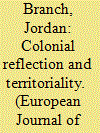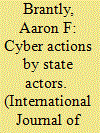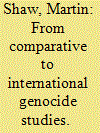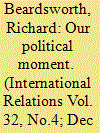| Srl | Item |
| 1 |
ID:
113808


|
|
|
|
|
| Publication |
2012.
|
| Summary/Abstract |
The modern international system is commonly argued to have originated within Western Europe and spread globally during centuries of colonialism. This article argues, instead, that the character of the modern system of territorially sovereign states resulted from a complex interaction between European colonizing polities and events, actors, and spaces in other parts of the globe. In particular, through a process of colonial reflection, many of the foundational ideas and practices of modern statehood were formed in the interactions of Europeans with the unknown, supposedly empty, spaces of the New World in the 16th and 17th centuries. These novel practices were applied only later to politics among states in Europe. Most important among these developments is the ideal of territorial exclusivity as the sole basis for state sovereignty. This analysis also has implications for the study of contemporary international systemic change.
|
|
|
|
|
|
|
|
|
|
|
|
|
|
|
|
| 2 |
ID:
132419


|
|
|
|
|
| Publication |
2014.
|
| Summary/Abstract |
Covert action is as old as political man. The subversive manipulation of others is nothing new. It has been written about since Sun Tzu and Kautilya. People and nations have always sought the use of shadowy means to influence situations and events. Covert action is and has been a staple of the state system. A dark and nefarious tool often banished to philosophical and intellectual exile, covert action is in truth an oft-used method of achieving utility that is frequently overlooked by academics. Modern scholars contend that, for utility to be achieved, activities such as war and diplomacy must be conducted transparently. Examined here is the construction of utility for a subset of covert action: cyber attacks.
|
|
|
|
|
|
|
|
|
|
|
|
|
|
|
|
| 3 |
ID:
117914


|
|
|
|
|
| Publication |
2012.
|
| Summary/Abstract |
Genocide is widely seen as a phenomenon of domestic politics, which becomes of international significance because it offends against international law. Hence there are as yet inadequate International Relations analyses of the production of genocide. This article challenges the idea of the domestic genesis of genocide, and critiques the corresponding approach of 'comparative genocide studies' which is dominant in the field. It analyses the emergence of more fruitful 'relational' and 'international' approaches in critical genocide studies, while identifying the limitations of their accounts of the 'international system'. As first steps towards an adequate international account, the article then explores questions of the international meaning and construction of genocidal relations, and of international relations as the context of genocide. It argues for a historical and sociological approach to the international relations of genocide, and examines 20th-century European genocide in this light. Arguing for a broader conception of this historical experience than is suggested by an exclusive focus on the Holocaust, the article offers an interpretation of genocide as increasingly endemic and systemic in international relations in the first half of the century. It concludes by arguing that this account offers a starting point, but not a model, for analyses of genocide in global international relations in the 21st century.
|
|
|
|
|
|
|
|
|
|
|
|
|
|
|
|
| 4 |
ID:
163097


|
|
|
|
|
| Summary/Abstract |
National interest and national security need to be reconfigured so as to accommodate a state’s response to global threats and challenges. This requires in turn addressing the following paradox: the pooling and ceding of sovereignty must be made in the very name of national sovereignty. The article maintains that it is one of the foremost challenges of political responsibility and political leadership today to assume this paradox and thereby align national and global interests and practices. The alignment can, it is suggested, effectively oppose sovereigntism and nationalism, on one hand, and abstract global governance, on the other. To promote this alignment, the article advances a renewed understanding of state responsibility to citizenship under conditions of globalization.
|
|
|
|
|
|
|
|
|
|
|
|
|
|
|
|